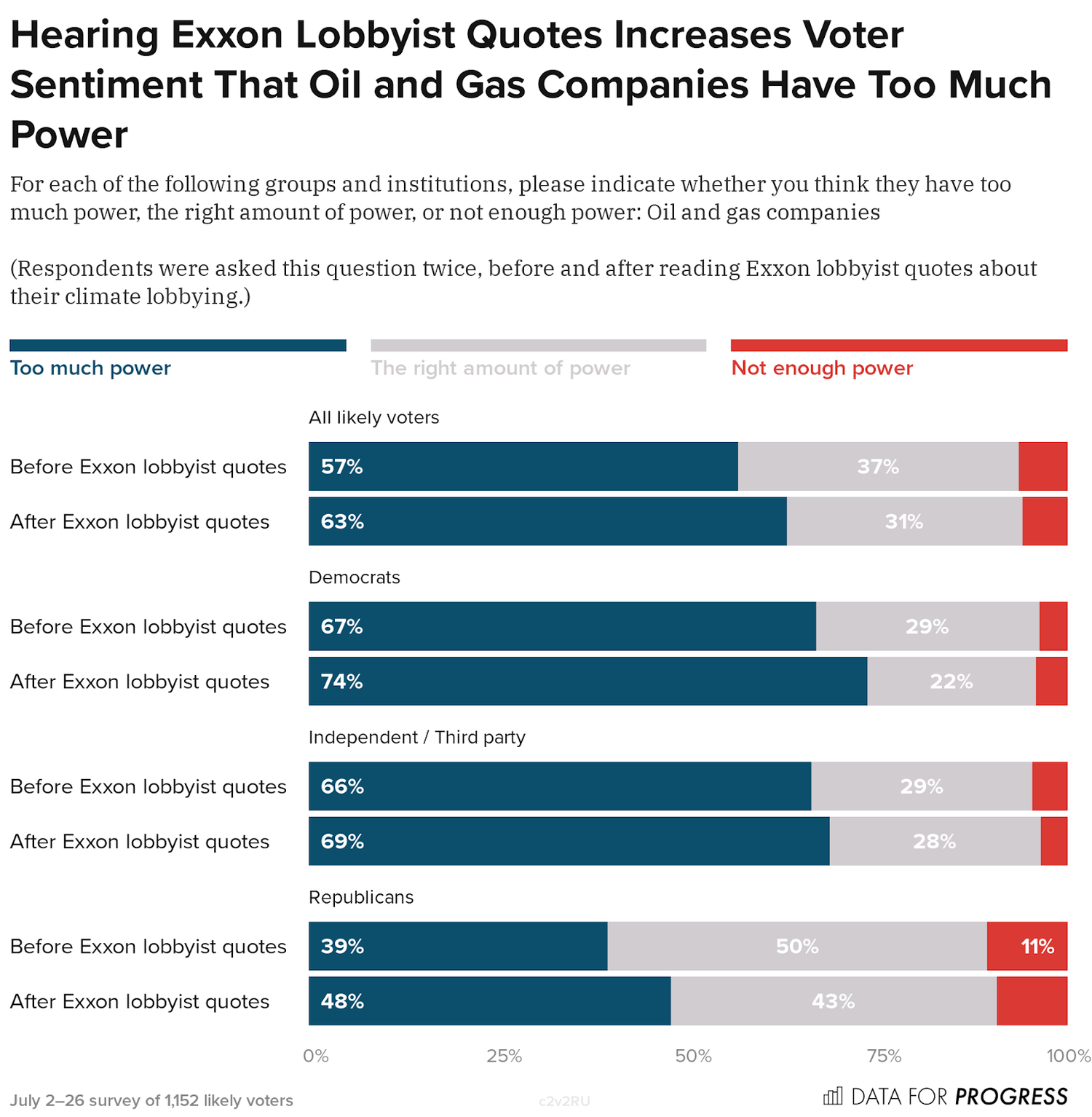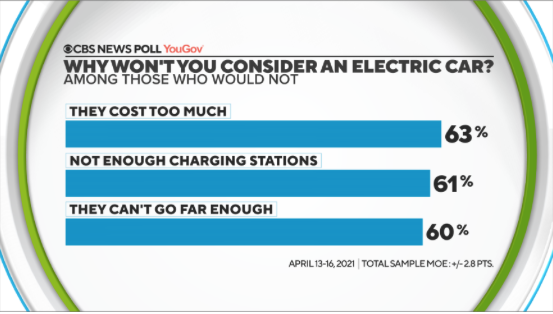Resources
Search below for resources covering the intersection of climate engagement, social science and data analytics.
RESULTS
Poll: Voters Say Higher Energy Prices Show Need to Increase Renewable Energy
Voters overwhelmingly agree that it is “more important than ever for the United States to become less dependent on fossil fuels” after Russia’s invasion of Ukraine. High support for increasing fossil fuel production in the short term shows that voters are feeling cross-pressured on the issue amid the current energy crisis. 75% agree with the statement that “the primary goal of U.S. energy policy should be achieving 100% clean energy.” 71% agree with the statement that “it is more important than ever for the United States to become less dependent on fossil fuels such as oil and gas because of the spike in gasoline and natural gas prices that have been caused by Russia’s war against Ukraine.” Majorities agree that increasing production of renewables would be better than increasing production of fossil fuels for energy independence (59%-35%), national security (55%-35%), and job creation (53%-36%). At the same time, however, voters are clearly feeling squeezed by high gas prices (54% are “very worried” about the price of gasoline) and the public is accordingly willing to accept several proposed remedies aimed at alleviating the energy crisis - including increasing the domestic production of fossil fuels. When they are proposed as policies to respond to the spike in gasoline and natural gas prices, majorities support both increasing the production of renewable energy in the United States (72% support / 18% oppose) and increasing the production of oil and gas in the United States (70% support / 18% oppose).
Environmental Polling Roundup - March 25th, 2022
This post includes climate and environment headlines, data points, and key takeaways from recent public polls - including new polling about increasing domestic energy production from different sources amid the crisis in Ukraine and a new poll on water-related environmental issues.
Environmental Polling Roundup - March 18th, 2022
This post includes climate and environment headlines, data points, and key takeaways from recent public polls - including new guidance for advocates on how to communicate about rising gas prices and the need to shift away from dependence on oil, new polling on Green New Deal proposals, a comparison of American adults’ climate attitudes to climate scientists’, and new polling of young voters about climate issues.
Poll: Connecting with Voters on Gas Prices
Amid the current energy crisis, voters are receptive to arguments about reducing the country’s dependence on oil; top-testing messages focus on energy independence and fossil fuel companies’ profits. 61% say that America’s continued dependence on oil is a major cause of rising gasoline prices today. 59% say it is very important for the President and Congress to take action to reduce America’s dependence on oil. Voters put a premium on making America more energy independent (71% say it is very important for the President and Congress to act on this). Clean energy advocates can take ownership of this goal by making the case that the best way for America to be truly energy independent is to increase the production of energy in the United States from clean and renewable sources, while reducing our dependence on oil. Seventy-seven (77%) percent of voters favor this approach to energy independence (which is a more meaningful long-term goal for voters than “energy security”), including 44% who strongly favor it.
Most Americans say they “support a ban on Russian oil” even if it means higher gas prices. 71% claim that they would “support a ban on Russian oil, if it meant higher gasoline prices in the United States.” The ban has strong majority support across the political spectrum with 82% of Democrats, 70% of independents, and 66% of Republicans in favor of it.
Poll: 60% of Americans say oil firms are to blame for the climate crisis
Oil and gas companies are unpopular, and most Americans say that oil and gas companies bear responsibility for causing climate change, especially after reading basic information on the topic. The survey found that major oil companies are underwater in their favorability among adults nationwide, including: BP (15% positive / 40% neutral / 33% negative); Shell (24% positive / 46% neutral / 26% negative); Exxon (22% positive / 43% neutral / 32% negative). By contrast, Americans tend to view other large corporations such as Apple (38% positive / 34% neutral / 28% negative), Amazon (50% positive / 21% neutral / 28% negative), Target (51% positive / 33% neutral / 15% negative), and Wal-Mart (43% positive / 27% neutral / 30% negative) more positively than negatively. Additionally, after reading information about how oil and gas companies misled the public about man made climate change, majorities of Americans agree with the following statements: the government and the public should hold oil and gas companies accountable today (62% agree); oil and gas companies should help pay to upgrade infrastructure so it can withstand the extreme weather events caused by climate change (60%); oil and gas companies should pay for the damages caused by extreme weather events attributed to climate change (56%).
Environmental Polling Roundup - August 6th, 2021
This post includes a roundup of climate + environment headlines from this week’s public polls, good data points to highlight, and a full roundup including key takeaways from each poll.
HEADLINES
- Climate Power + LCV - Investments in clean energy, climate action, and environmental justice bolster support for the reconciliation bill; the most persuasive messages focus on economic aspects including how the bill will lower costs for households (Slide Deck)
- Climate Power + Data for Progress - Voters support a range of climate-related proposals that were left out of the bipartisan infrastructure bill, especially clean electricity incentives, investments in energy efficiency, and investments in solar and wind (Release, Memo, Topline)
- POLITICO + Morning Consult - Voters continue to back the bipartisan infrastructure bill, especially investments in roads, bridges, and water infrastructure; voters are more split on the reconciliation package, but overwhelmingly support expanded home care for the elderly and disabled (Topline, Crosstabs)
- Data for Progress - Voters think that oil and gas companies have too much power, especially after learning about comments made by a senior Exxon lobbyist; “oil and gas companies” are a more compelling villain than “fossil fuel companies” (Release, Topline)
- Yale Program on Climate Change Communication + George Mason University Center for Climate Change Communication - Petition signing is the most appealing ask to get voters involved in climate advocacy, and there is clear interest in community preparedness groups (Summary, Full Report)
Oil and Gas Companies Have Too Much Power
Many Americans believe that the oil and gas industry has too much power and influence in Washington, with support coming from both sides of the aisle. Two-thirds (67%) of Democrats believe the industry has too much power, while 39% of Republicans agree that they have too much power. When presented with quotes from an Exxon lobbyist that highlights the influence Exxon has in the capital, however, these percentages increase to 74% and 48% respectively. Finally, this research finds that when “oil and gas companies” is used, rather than “fossil fuel companies,” the percentage who believe that the industry has too much power increases. Advocates interested in highlighting these finding should consider focusing on the bipartisan distrust in the oil and industry, and use “oil and gas” language rather than “fossil fuel” language.
Poll: More Voters Than Not Oppose Developer’s Decision to Abandon Keystone XL Pipeline
Voters have mixed reactions to the Keystone XL cancellation and to halting fossil fuel projects more generally. Morning Consult’s national tracking poll included a few questions on the Keystone XL pipeline cancellation. While voters didn’t pay much attention to it (just 12% report that they heard “a lot” about the story), more say they oppose the pipeline’s cancellation (42%) than support it (32%). The poll also asked whether voters generally believe the U.S. should “stop or continue to allow the construction of major new fossil fuel infrastructure, like pipelines.” A narrow majority (52%) are in favor of allowing new fossil fuel projects, while just 29% want to stop them.
Poll: What drives views on electric cars?
- Americans' views on whether they would buy an electric car are split relatively evenly, with 30% of respondents saying they "would consider it," 33% saying they "might consider it," and 37% saying they would not consider it.
- When asked why they would not consider buying an electric car, top answers people gave were they feeling like electrics cars "cost too much" (63%), "can't go far enough on a charge" (60%), and that there aren't enough charging stations on the road (61%).
- Partisanship also appears to play a role, with respondents who identify as Democrats a lot more likely to at least say they'd buy an electric car than those who identify as Republicans, regardless of whether they live in rural, urban, or suburban areas.
- 64% think recent announcements from car makers that they are shifting to making mostly (or all) electric cars is a "good idea."
- While many more people (41%) think U.S. policy should encourage people to buy electric cars than to buy gasoline cars (11%), a plurality of respondents (4*%) believe the U.S. policy should "not take a position."
Pagination
- Previous page
- Page 3
- Next page





